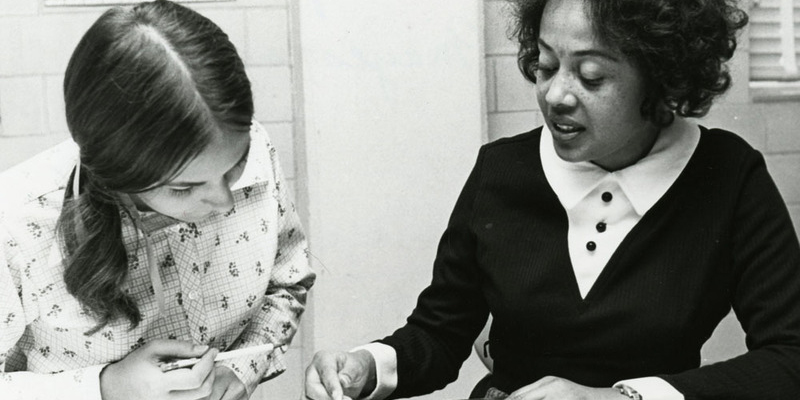Vivienne Malone-Mayes: Baylor’s first African-American professor, trailblazer for equal rights

Dr. Vivienne Malone-Mayes first became aware of segregation as a preschooler, when she used the wrong public water fountain. Her mother, horrified, yanked her back and pushed her toward the other fountain. “She just explained to me that this was the way the world was, and we had to accept it, and there was nothing we can do about it, and we had to just sit there and adjust to it,” she said in a 1987 interview.
But Malone-Mayes was not one to “just sit there and adjust to it,” and 30 years later — 50 years ago this fall — she became Baylor’s first African-American professor, and eventually a beloved institution at Baylor for more than a quarter-century.
Despite the barriers that faced young black women in the 1940s and ’50s, Malone-Mayes graduated from Waco’s A.J. Moore High School in 1948 at just 16 years old and immediately enrolled at Fisk University in Nashville. There she earned her bachelor’s and master’s degrees, studying both medicine and mathematics, and met her inspiration, Dr. Evelyn Boyd Granville — the first black woman to earn a Ph.D. in mathematics. After graduation, she taught for seven years at Paul Quinn College and one more at Bishop College, chairing the math departments at each stop.
In 1961, when Malone-Mayes decided to get her own Ph.D. in mathematics, she applied to Baylor — but was rejected because of her race, and instead went to the University of Texas. By the time she had completed her doctoral studies, Baylor had officially integrated, and in a beautiful twist of fate, the university hired her as its first African-American professor.
Malone-Mayes was absolutely adored by Baylor students. One of her favorites was actually a student who, all semester, heckled her throughout her math class out of frustration. “He would ask all of these questions and then comment, ‘Why is that necessary to know? Why do we have to know that?’” she said in a 1994 interview. “But the second semester, I walked in my room, who do you think was sitting on the first row in the middle? … When I walked through the door, I took a step and saw him and stopped in my tracks. And the whole class just fell out laughing. They just fell out laughing. And I said, ‘Oh no, not again.’ And he fell out laughing. And from that point on, we were just the best of friends.”
Malone-Mayes also earned high esteem outside of Baylor. She served as director of the Texas section of the High School Literature Program, director-at-large for the Texas section of the Mathematical Association of America, a member of the board of directors in the National Association of Mathematics, and the first African American elected to the executive committee of the Association of Women in Mathematics. She served the Waco community as well, through her church and via seats on the boards of directors for Goodwill Industries, Family Counseling and Children’s Services, and the Heart of Texas Region Mental Health and Mental Retardation Center.
Malone-Mayes was known all over Waco and the Baylor campus for her fiery dedication to justice and for her ability to help students truly grasp the finer points of mathematics. And just 10 years after she was denied acceptance at Baylor, she was voted Outstanding Faculty Member of the Year. She went on to teach at Baylor until 1994, when she retired due to ill health; a year later, she suffered a heart attack and died at the age of 63.
Following her passing, the Association of Women Mathematicians wrote: “All her life, to its very end, she was in the struggle to make the path smoother for those who followed. She made her presence in the national mathematics community felt and respected. … In the organizations specifically devoted to the problems of minorities and women, there she was too. With skill, integrity, steadfastness and love she fought racism and sexism her entire life, never yielding to the pressures or problems which beset her path. She leaves a lasting influence. From her life, the world has gained much. In her premature death we have all lost. Inspired by her life, we are bereaved at the loss of a loving and beloved friend.”
Sic ’em, Dr. Vivienne Malone-Mayes!
You might also like:
* Baylor unveils memorial to Dr. Vivienne Malone-Mayes, BU’s first black professor (Feb. 2019)
* Barbara Walker: Social work leader and Baylor’s first female African-American graduate (Feb. 2017)
* Robert Gilbert: Pastor, civil rights leader, and Baylor’s first African-American graduate (Oct. 2016)

